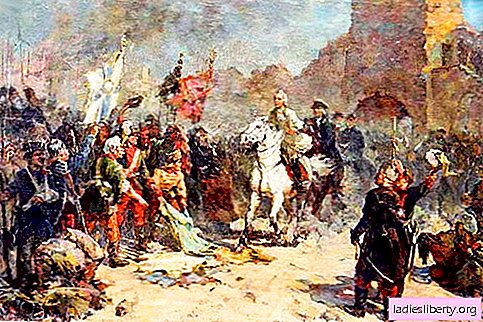
Holidays December 24
Day of military glory of Russia
The Russian army under the command of Suvorov took the Turkish bastion of Izmail. The holiday is regulated by the Federal Law of the Russian Federation. During the Russian-Turkish war, the capture of Ishmael, he was considered the stronghold of Turkish rule on the Danube River, was of particular importance. As you know, the fortress was built under the strict control of German and French engineers, it corresponded to the latest fortification requirements. The Danube, which in that place was almost half a kilometer wide and 6-10 meters deep, defended this fortress from the south. A moat was dug around the walls of the fortress, in which there was water two meters deep. Inside the city there were a large number of stone buildings that were convenient for defense. If he speaks of the garrison of the fortress, then he totaled 265 guns and 35 thousand people. The Russian army began the siege of Ishmael in the month of November, 1790. Two attempts were made to take the fortress, but they were unsuccessful. After that, His Grace Prince and Commander-in-Chief of the Russian Army, Field Marshal G.A. Potemkin ordered, whatever the cost, to take an impregnable fortress. The troops began intensive preparations for the assault. Suvorov sought to avoid bloodshed, so he sent the commandant of Ishmael to demand the surrender of the fortress, but in response he received that, rather, the sky would fall to the ground and the Danube would flow upwards, than Ishmael would surrender. Then the Russian troops from different directions with nine columns advanced to storm the fortress. When the river flotilla swam ashore, under cover of artillery fire, and landed troops on land. Thanks to the skillful leadership of Suvorov and his associates, the courage of soldiers and officers, Ishmael was taken, the battle lasted nine hours. Our troops suffered huge losses, 1815 people were killed and 2455 wounded. Interestingly, the fortress garrison was much stronger in number and configuration than our army, and nevertheless could not defend the fortress. Success was ensured by the thoroughness and secrecy of preparation, the suddenness of action and the simultaneous blow of all nine columns, a clear and precise goal setting.
Day of the Worker of Archival Institutions of Ukraine
In Ukraine, December 24th is celebrated as “Day of Workers of Archival Institutions”. According to the Decree of the President of Ukraine, the holiday was founded on October 30, 1998. If you quote the decree, you can read the following: “Given the significant contribution of the archival organizations of Ukraine to the progress of domestic science and culture, as well as to other areas of our society, to the need for further quality improvement archival business and to help employees of archival institutions, I make a decision: to establish in Ukraine a personnel holiday for employees of archival institutions, "which should be celebrated annually on December 24". In Ukraine, the first state archival management body was created during the time of the Central Council. This was, throughout December 1917 and April in 1918, headed by Professor O.S. Grushevsky. The Central Archival Administration under the Council of Ministers of the Ukrainian SSR began its work in 1974. When Ukraine gained independence, the legal status and name of the main archive changed. Since December 1999, this Library and Archival Department has been called the State Committee for Archives of Ukraine. The total number of employees of archival institutions exceeds three thousand people. More than 58 million units of various types of important documents of the main National Archival Fund are stored in archival institutions of the State Archive of Ukraine system.
Catholic Christmas Eve
This holiday is celebrated on the eve of Christmas. It is believed that its name came from the word "sochi", the so-called special cereal porridge, seasoned with fruit and honey. She is supposed to eat after the service of the liturgy, which goes into the evening, on the eve of the holiday. It was believed that you can’t eat anything until the first evening star, this tradition is associated with the appearance of a star in the East, which announced the birth of Christ. Although the charter does not say anything about this tradition. Usually, the father led the entire Christmas Eve supper ritual. Before starting to eat food, they always read the Gospels of St. Luke about the Nativity of Christ and made a common prayer with the whole family. As usual, during dinner, people exchanged plates of unleavened bread, on which were curly patterns that symbolized the body of Christ, these plates were called cachets. A piece of cachet was broken off and given to each other, and the one to whom it was presented should have said a good wish. This was the most important and touching moment of this evening. It was also customary to leave an empty place at the festive table, in case someone comes to accept him as a loved one and a loved one.
Christmas Eve in Bulgaria
In Bulgarian, this holiday is called Bydni evening. This is a national holiday of the Bulgarians, one of the well-established family holidays. This holiday is dedicated to preparing for the great feast of the Nativity of Christ. Both men and women take part in the celebration. Men gather in groups, cut the pig the next day to the holiday table. Meanwhile, women bake ceremonial bakery products and cook non-greasy dishes for Christmas Eve. The owner of the house where the holiday will be celebrated is preparing an oak log for the festive hearth. It is called the “cob" and personifies the "Young God", who is to rise again that night. According to custom, the owner enters the house with a log and asks: “Do you glorify the Young God?”, You need to immediately answer this: “Glory, glory, welcome!”. The introduction of this symbol into the house embodies the hopes of a large harvest and plenty of cattle next year. A cliff was laid in the middle of the hearth when a fire was lit, laid so that it burned all night. On this day, very interesting dishes are put on the table. Ritual bread is considered to be the main dish - “goddess”, it was kneaded on “silent water”, girls brought this water from the well in the morning, and while they brought water, they did not talk to anyone. This bread is decorated with different figures depicting livestock, a haystack, a house, these figures were arranged so that when they break it, everyone got a piece of this stuff. Even on this day, several loaves are baked, so that when the carollers come to treat them. When the first piece is cut from the ceremonial bread, it is placed in front of the home icon, a small part of the bread is given to the livestock, and the rest is distributed among the family members. Recently, they began to put a coin in bread. It is believed to whom this coin comes across, there will be luck in all matters. Traditionally, after dinner, everyone was waiting for the carollers.
The Constitution of the Republic of Transnistria adopted
The Constitution was adopted by popular vote, on December 24, 1995, 82% of voters cast their votes for the new edition. According to the new Constitution, a parliamentary-presidential model of government is established in the republic. The President has the right to submit the composition of the PMR Government to the Supreme Council for approval, but he was obliged to coordinate this with the Supreme Council, he was also authorized to make changes in its composition, and could dismiss members of the government. The President was the head of state, is the head of the system of government, independently manages the interstate policy of the state, is the Commander-in-Chief of the Armed Forces of the Transnistrian Republic, ensures the maintenance of public order, and the state system of the PMR. The tenure of the President in his post is five years, he does not have the right to hold this position twice in a row.
December 24th in the folk calendar
Nikonov day
On this day, Orthodox people honor the memory of St. Nikon Pechersky, he was a monk of the Kiev-Pechersky monastery. A clergyman was born in a noble and prosperous family at the end of the eleventh century. When the Polovtsian troops stormed the Kiev lands, Nikon was taken into slavery. The monk was held captive for about three years, he patiently endured hunger and torment. So that Nikon would not run away, the owner cut his veins on his feet, but one day the captured saint simply disappeared in front of the guard. Soon the people of Kiev signed a peace treaty with the Polovtsy. Arriving at the Pechersky Monastery, the former tormentor Nikon recognized one of the old monks as his former prisoner. The Polovtsian was amazed at this meeting, he was baptized, and served faithfully to the former prisoner until the end of his days. Subsequently, people began to say that on this day, "Nikon is at the icons." It was customary to pray on Nikon's Day, believers asked to drive away the evil spirits, which they thought circled the earth with blizzards. Still people took for truth that Saint Nikon can give peace to any soul. The peasants lit the lamps and asked the sun to descend to the earth, to shine and drive away unclean power from them. People believed that witches fly above the ground on their broomstick and raise terrible snow whirls, and this will continue until the day arrives.
Historical events December 24
December 24, 1790 captured Turkish fortress Izmail
On this day in 1790, the Russian army besieged the Turkish fortress of Izmail. The defense of the city was commanded by a Turkish military leader, Aydos Mehmetpasha. The city had powerful defensive fortifications. The circumferential rampart around the city reached a height of 8 meters, and the moat was 12 meters wide and 10 meters deep. The garrison of Ishmael totaled 35 thousand soldiers and 265 guns. Russian troops had 31 thousand soldiers and 500 guns, in support of the ground forces, a flotilla de Ribasa was sent, Alexander Suvorov commanded the troops. After the Turks refused to capitulate, the Russian troops began to storm the city, after fierce fighting, the Russians took Ishmael. The Russian side suffered relatively minor losses - 4,000 killed and 6,000 wounded. The Turkish losses were catastrophic - 26 thousand killed and 9 thousand captured and wounded. The capture of Ishmael put an end to the protracted and debilitating Russian-Turkish war. As a result of the military company, Russia received large territorial acquisitions: the northern Black Sea region and Crimea.
1943 year Dnieper-Carpathian operation
December 24, 1943, the forces of the first Ukrainian front went on a massive offensive in the Vinnitsa direction. The purpose of the operation was the encirclement and destruction of the Korsun-Shevchenkovsky group of Germans. The first days the offensive developed successfully, but the field countermeasures of Field Marshal Manstein slowed down the Soviet offensive. By January 12, on the offensive of the Soviet army, the German command was able to concentrate ten advanced infantry and six special tank divisions. This allowed the German troops to launch a powerful counterattack and push the Soviet units 50 km back. Upon learning of the retreat, Stalin ordered the return of the lost positions at all costs and transferred to the first Ukrainian front, part of the forces of the second Ukrainian front. By forces of two fronts, Soviet troops managed to capture Kirovograd and squeeze the Germans 20 km, but so far they have not been able to regain their previous positions. A few days after the start of the large-scale offensive, the forces of the two Ukrainian fronts were significantly depleted and on January 16, 17, the Soviet units went over to the defensive. Only on January 24, after the transfer of several tank, infantry, and air corps to help, the front-line armies launched a large-scale offensive and freely penetrated the enemy’s defenses. The offensive lasted more than two weeks and ended with the encirclement and defeat of the German divisions.
1653 years the army of Bogdan Khmelnitsky inflicted a heavy defeat on the Polish army at Zhvanets.
December 24, 1653, the troops of the Hetman Bogdan Khmelnitsky, with the support of the Tatar units, inflicted a heavy defeat on the Polish army in the battle of Zhvanets. However, after the victory over the gentry, the Tatars, bribed by the Poles, turned against Khmelnitsky and began to devastate Ukraine again. Realizing the difficult situation prevailing for Ukraine, the hetman Bogdan Khmelnitsky decides to ask the Tsar of Moscow to take Ukraine under the protection of Muscovy. On October 1, 1653, Tsar Alexei convened the Zemsky Sobor, at which he called on the boyars to take Ukraine into Russian citizenship, together with its people and the Zaporozhye army. In response, on January 8, 1654, in Pereyaslavl, a specially created parliament, a decision was made to petition the Russian Tsar to accept the Little Russian people into the subjects of the Moscow kingdom. However, the elders of the elite made the decision of the hetman without enthusiasm, because the people dreamed of an independent power. The clergy also cautiously accepted the fact of the Russian protectorate over Ukraine.
1982 year the first An-124 Ruslan aircraft took off in Ukraine
December 24, 1982, its first flight was carried out by the super-heavy transport aircraft An-124 (RUSLAN). At that time, the aircraft became the largest military transport aircraft in the world. This miracle of technology was created in Kiev OKB. Antonova. The size of the ship shocked everyone who first saw it. The height of the hull was 21.1 meters, the wingspan was 73.3 meters, the take-off weight was almost 400 tons, its carrying capacity was 120 tons, and its flight range was 16,000 km. In 1990, "Ruslan" flew around the Earth, the aircraft did not need much time, 72 hours 16 minutes. The vessel is capable of flying over virtually any distance. The introduction of the aircraft into the armed forces of the USSR and mass production began in 1987. From 1984 to 1988, on the basis of the An-124, an even more ambitious aircraft, the super-heavy An-225-Mriya aircraft, was designed and built. The new airliner, in many respects, surpassed its predecessor many times over. Mriya, which is capable of carrying the Buran space shuttle, the ship is listed in the Guinness Book of Records. Today, the An-225-Mriya is the largest aircraft in the world, and to this day it has no repetitions.
1801 year first steam car demonstration
December 24, 1801 in England, in the city of Cambourne, the world's first steam engine was demonstrated. The world's first car was created by an outstanding designer Richard Travik. The machine could carry up to eight passengers and was driven by a steam installation. The first design had a number of inconveniences, in order to maintain pressure in the boiler, coal had to be constantly thrown up, and this required not only the driver, but also the stoker to keep the vehicle staff. But despite the imperfection of the steam car, at that time this event was a revolution in technological progress, because it became possible to move without the use of horsepower. And it was cheaper and absolutely did not require rest for cars. The car Trevitika could reach speeds of up to 24 km / h and without repair could drive up to 3,000 km. Repeatedly upgraded steam cars were used until 1910.
December 24 were born:
James Headley Chase (1906-985), English writer of detective novels
The real name of the writer is Rene Brabazon Raymond, his father was a retired officer. He began his studies at the royal school in Rochester, then he studied in Calcutta. Chase dropped out and left home at eighteen.He changed many works, tried himself in many professions, but could not choose a lesson for himself until he became an agent and distributor of the books of the Children's Encyclopedia, he went home and offered people books, got acquainted with the future heroes of his novels, talked , recognized their character. A few years later, Chase got a job at a large wholesale book company, worked there as a simple seller, rose to the post of head of the department for the supply of goods to specialized bookstores. It was here that Chase began to study various literature, read both day and night, in any free time he immediately picked up a book. Soon, James decides to write something himself. He began with humorous stories, wrote them under various pseudonyms. At the age of 32, Chase wrote his first detective story, he called it "No Orchids for Miss Blendish." The novel’s publishers, critics and readers admired the novel and became the best-selling bestseller of the decade. After the publication of the novel, Chase became a professional writer of detective stories, he writes a lot, his novels are often published, but military service during the Second World War interrupted his work for a short time. When writing his novels, Chase used dictionaries of American slang, detailed maps, encyclopedias and reference notes about the life of the American criminal world.
Taari Halonen (1943), President of Finland, first lady elected to this post
Born in the family of a builder. Grew and lived all his life in the not prestigious poor area of Helsinki. He has a university degree in Helsinki, and a Ph.D. in law. She began her political career with the Secretary of the National Student Union of Finland, and managed social security issues. In the 70s, she worked as a lawyer in the Central Education of Trade Unions of Finland, and took the prestigious post of Secretary of the Prime Minister in the Parliament of Finland. Nine years later, Tarja was elected to the parliament from the Social Democratic Party of Finland. In the 90s, she worked as the second Minister of Social Security and Health. She was later appointed Minister of Justice in the government. And finally, from 1995 to 2000, she was the Minister of Foreign Affairs in the government of P. Lipponen. Tarja was the first woman in Finland to become the head of the Ministry of Foreign Affairs. In March 2000, this woman became president of Finland. This is a historically important moment for the country, for the first time a woman was elected as president.
This great woman knows three languages perfectly, and she also studies Russian in order to get to know her neighbor better. In his free time he likes to delve into his garden plot, is fond of theater, likes to draw. Relates himself to the Christian faith.
Victor Balashov (1924), Soviet television presenter, People's Artist of Russia, television announcer
At a young age, the artist enthusiastically engaged in sports and amateur performances. Victor was the best sambo fighter in Moscow, and at the same time he studied at the Youth Theater Studio. The guy had an attractive appearance and the talent of a novice actor, this gave hope for a successful career in film and theater. But all the plans that Victor built were destroyed by the war. The guy really wanted to get to the front, and so he forged the date of birth in the documents, adding himself several years. In the war he was wounded and demobilized as a disabled person, and returned to Moscow. All this time, Victor dreamed of becoming an artist, but due to the fact that he went with a wand to the stage, his path was closed. Friends advised him to go on the radio, as a war invalid, they listened to him out of turn and hired him for the only radio studio in the country. So Victor became the announcer of All-Union Radio.
In 1947, Balashov was invited to the Central Television, but they gave him small work, which he quickly became uninteresting, and he decided to leave for the province and work there on television. Then people were sorely lacking there, and Victor was immediately offered three cities, Balashov chose Vladivostok. There he worked on television, with a microphone in his hands, studied mastery. Victor did all the work there himself, wrote reports, edited his materials, and directed them. In 1950, the leadership of Central Television invited him to return to Moscow. From then until 1996, Balashov worked on Central Television, broadcast a wide variety of broadcasts, covered congress meetings, broadcast new achievements and sports records, and made reports from factories. The famous presenter has great talent and professionalism, his voice and manner of conducting programs have become a role model. Victor combined work on radio and television with dubbing of various films. Today, the People’s Artist of Russia is an impeccable, delicate, respected colleague, and his unique voice has become the standard of speaker reading and has been pleasing the audience for more than fifty years now on television screens.
Adam Mickiewicz (1798-1855), Polish poet and patriot
From the age of nine, Adam studies at the Dominican school, from seventeen at the University of Vilnius. The student life of the young poet took place in a fun and kind atmosphere. At the university, Adam writes his first poem, Ode to Youth. After graduation, Miscavige works as a teacher in Kovna until his arrest and deportation from Lithuania. The reason for the arrest and expulsion was Mitskevich’s anti-government statement and his participation in opposition movements. Further, several years of life in Russia, rapprochement with Russian representatives of the literary intelligentsia: A.A. Bestuzhev, E.A. Baratynsky, A.S. Pushkin and others. With Pushkin, Miscavige was bound by a bond of special friendship and creative cooperation. After Russia, Miscavige lived in Germany, Switzerland, and France. In Paris, Adam is engaged in journalism and pedagogy, actively collaborating with Lithuanian, Belarusian and Polish emigrants. In 1840 he became a professor of Slavic literature at the University of de France. In 1855 he emigrated to Constantinople, where at that time a terrible cholera epidemic broke out, Mickiewicz also becomes a victim of the epidemic and dies of an illness on November 26, 1855. Adam Mickiewicz named the volcano on Mercury.
Alexander Fadeev (1901-1956), public figure and Soviet writer
Alexander Alexandrovich Fadeev was born and raised in the Tver province in the village of Kimry, in a family of revolutionaries, was a member of the hostilities in the civil war, joined the Communist Party. He graduated from the Moscow Mining Academy, was sent for party work in Rostov-on-Don and Krasnodar. Alexander began to write from a young age. The first experience is the story "Spill", and the next work is the novel "The Smash", after which he decided to become a professional writer. Fadeev was a prominent public and literary figure, held for a long time leading posts in various writers' associations and organizations. He enjoyed great authority among Stalin himself, he was invited to the celebration of the 60th anniversary of the historical leader, it usually took place behind the closed door of a narrow circle of associates. When the Great Patriotic War ended, Alexander wrote the novel "The Young Guard" about the Krasnodon underground organization, which operated in the territory occupied by the Nazis, many of whose members heroically died. The book, published in 1946, was subjected to harsh criticism, because the "leading and directing" significant role of the great Communist Party was allegedly insufficiently expressed in the novel. Fadeev, in essence, was given "catch up" by Stalin himself. The writer took into account the wishes, in 1951 the second novel "Young Guard" was published. In the last years of his life, Fadeev was very fond of alcohol and could fall into long binges. Fadeev ended his life with suicide. His last novel remained incomplete.
Name day on December 24th:
Daniel, Ivan, Peter, Eve.











